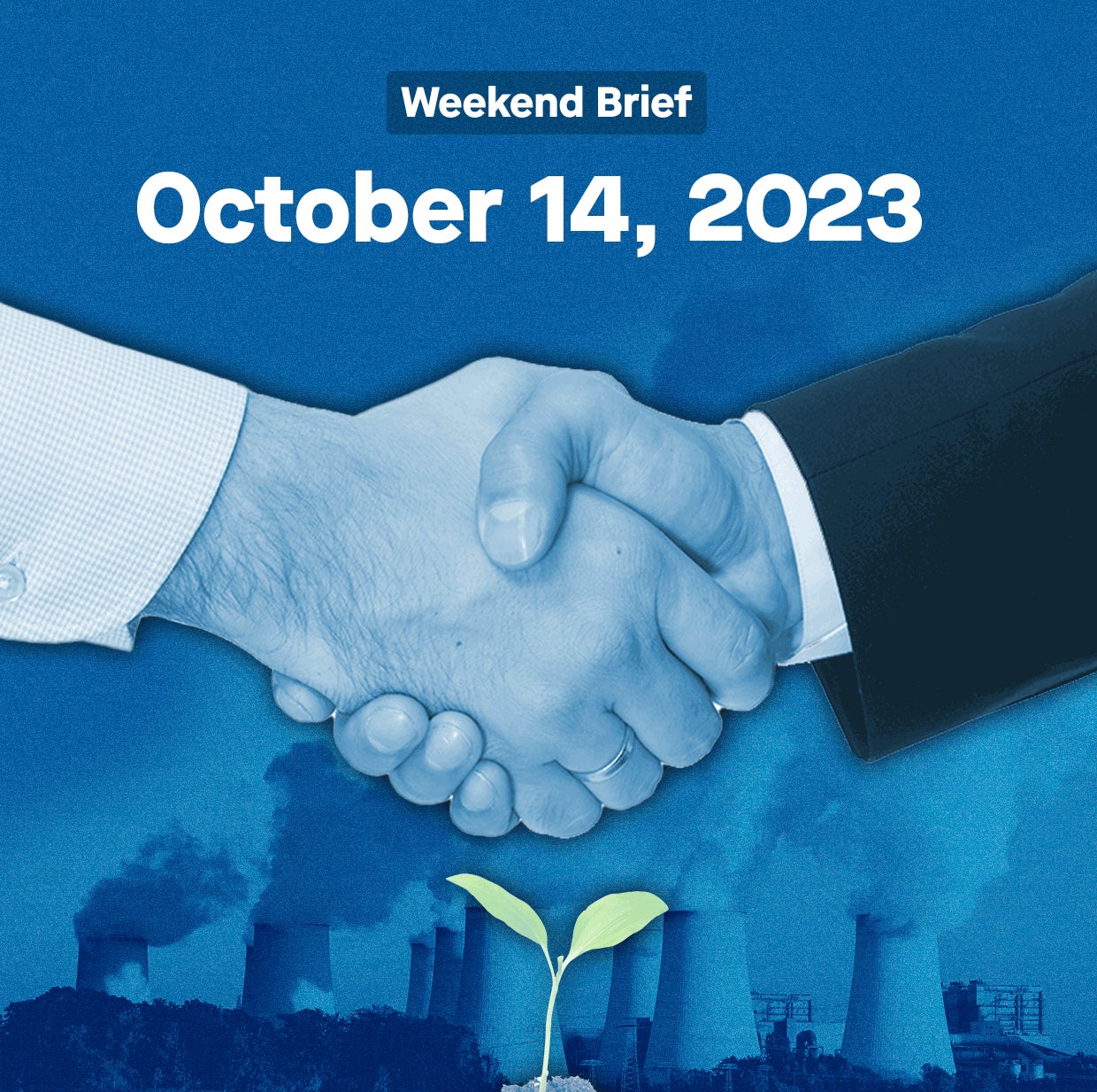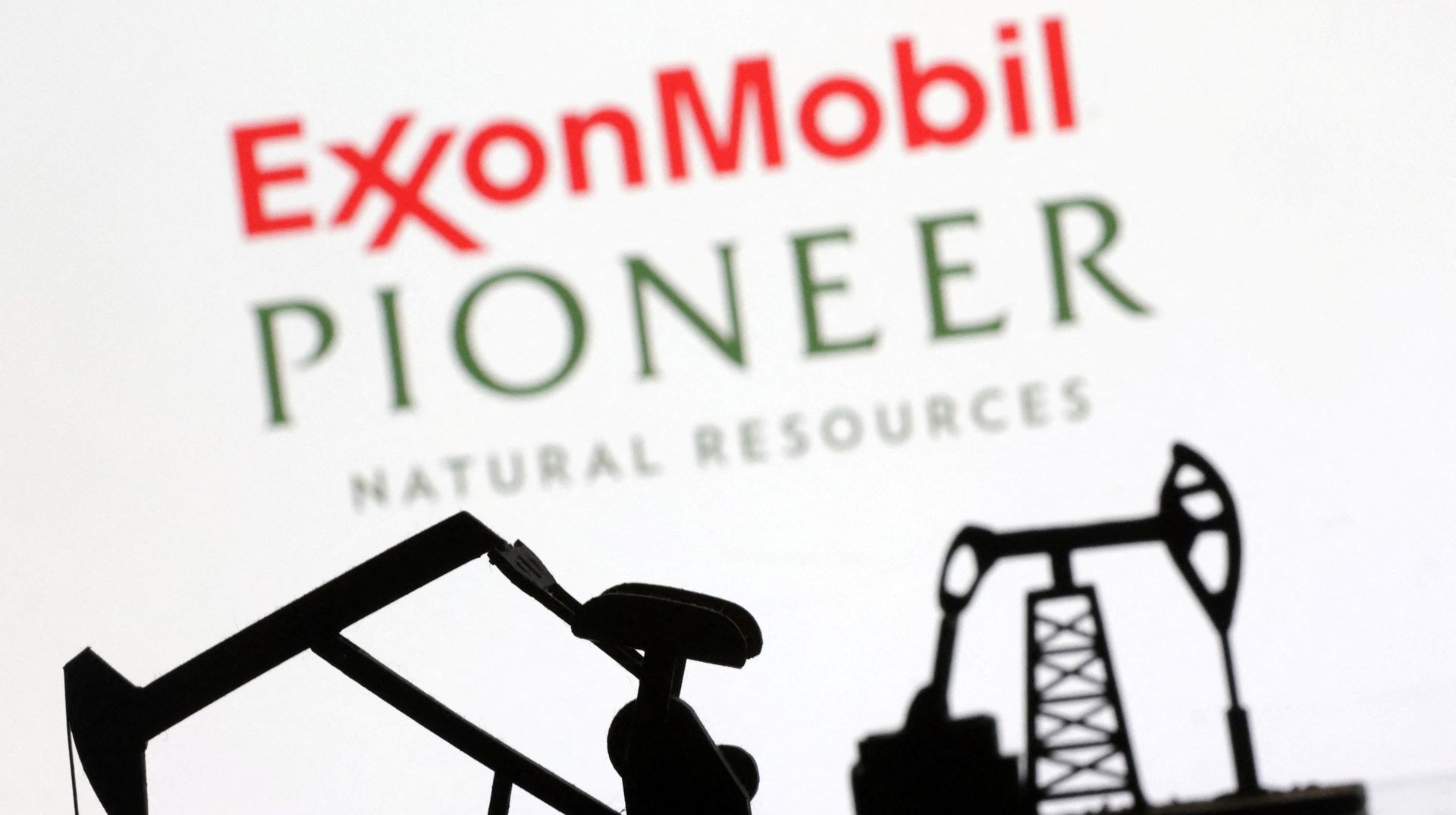Can ExxonMobil be trusted?
The fossil fuel giant is selling its acquisition of Pioneer as a win for the environment


ExxonMobil wants to convince the world that its nearly $60 billion purchase of Pioneer Natural Resources, announced this week, is actually good news for the environment.
The acquisition, Exxon’s largest since it merged with Mobil two decades ago, is poised to created a colossal fracking operator in the Permian Basin, an oil-rich region straddling West Texas and New Mexico. This doubling down on fossil fuels comes as the temperature of the Earth is at its hottest, and heating up more.
But don’t worry about climate change! Exxon, which of late has been spewing corporatespeak about “net-zero greenhouse gas ambitions,” is addressing the climate impact of this deal in language that is similarly vague and circumspect. Exxon CEO Darren Woods told CNBC the combined company will “lower our environmental footprint and plan to accelerate Pioneer’s net-zero plan from 2050 to 2035.” And he told the Wall Street Journal the deal will “grow shareholder value and improve the environment.”
While Woods hasn’t paid heed to calls to transition to renewable energy, he has said he’s focused on buttressing the company’s 140-year-old core business with lower-carbon solutions, such as hydrogen, carbon capture and storage, and lower-emission fuels. “Our job in that space is to leverage our capabilities, continue to evolve that technology, drive down those costs, and then build up those businesses at scale,” Woods said in a McKinsey interview last month.
Now that Exxon is combining forces with Pioneer, the nonprofit Environmental Defense Fund (EDF) says things could take a turn for the better, or for the worse, when it comes to important milestones like reporting methane emissions—“an area where Pioneer has made industry-leading commitments but where Exxon has fallen short,” the environmental advocacy group says. “Exxon now faces a choice: double down on old, dirty ways of doing business, or use this acquisition to demonstrate to its investors that it is serious about its decarbonization efforts.”
We don’t know how Exxon will proceed (the company didn’t get back to us when we requested a comment). But its growing commitment to fossil fuels and historical lack of transparency suggest some skepticism is warranted.
The Exxon-Pioneer deal, by the digits

40%: The percentage of US oil products that the Permian Basin accounts for
18%: The percentage of US natural gas production that Permian accounted for last year
850,000 net acres: Pioneer’s leaseholding in the Permian Basin
1.3 million barrels of oil: What Exxon’s daily Permian production will more than double to when the deal closes next year, based on 2023 volumes (it’s expected to reach 2 million by 2027)
$17 billion: Investment Exxon will make through 2027 into low-carbon technologies such as carbon capture, while spending up to $25 billion each year in the same period on its fossil-fuel business
A peek into ExxonMobil’s decades-old climate change research
A strategy of expanding Exxon’s oil and gas footprint is fully in line with the company’s public stance on fossil fuels, but contrary to decades of its own internal research.
As early as 1977, Exxon was aware of climate change and actively researching it with great accuracy, according to an eight-month long investigation by Inside Climate News published in 2015. Senior scientist James Black, who worked on hydrogen bomb research at Oak Ridge National Laboratory in the 1950s, warned against carbon dioxide emissions harming the planet’s health irreversibly and urged the company to take action.
By the next year, the company spent $1 million outfitting its biggest supertanker to measure the ocean’s absorption of carbon dioxide. At the time, scientists at Exxon floated the idea of taking the lead “in trying to define whether a long-term CO2 problem really exists, and if so, what counter measures would be appropriate.” Internal draft memos and archived presentations echo the same sentiments over the next decade.
But none of that panned out. Instead, Exxon used the science as a jumping off board to cast doubt on its veracity.
Over the last few decades, the company has spent a lot of time and money building and disseminating disinformation campaigns downplaying the role of fossil fuels in global warming. The shale giant has been sponsporing think tanks, advocacy groups, trade associations and contrarian scientists to do the work. After the Koch brothers, ExxonMobil is the biggest backer of groups intentionally spreading climate change disinformation.
A non-exhaustive timeline of Exxon’s climate change denial
1989: Exxon helps create the Global Climate Coalition with around 60 other businesses to question the science behind climate change concerns. (It would disband in 2002.)
1998: Exxon plays a role in stopping the US from signing the Kyoto Protocol international treaty on climate.
1999: In the year Exxon and Mobil merged, then-CEO Lee Raymond said future climate projections “are based on completely unproven climate models, or, more often, sheer speculation.”
2001: An Exxon advertisement titled “An energy policy for the new administration” argues that “the unrealistic and economically damaging Kyoto process needs to be rethought”—words then-president George W. Bush would echo months later.
2004: Exxon puts out more ads questioning scientific predictions around climate change, all serving to delay climate action conversations.
2007: Exxon’s Corporate Citizenship Report claims it’ll stop funding climate-denying groups. It doesn’t entirely, though.
2015: Inside Climate News and the Los Angeles Times publish exposés detailing Exxon’s knowledge of climate threats for decades. Politicians call for a justice department probe into Exxon’s campaigns lying about climate change.
2016: At Exxon’s annual shareholders meeting in Dallas, 10 of the 14 proposed resolutions are climate-related. All of these are voted down.
2017: Researchers analyzing Exxon’s 40-year history of climate communications find a mismatch in what Exxon was saying internally or in academic circles versus what it was telling the public.
Quotable: Exxon Mobil’s profit lens on climate change
“Did we aggressively fight against some of the science? Yes. Did we hide our science? Absolutely not. Did we join some of these ‘shadow groups’ to work against some of the early efforts? Yes, that’s true. But there’s nothing illegal about that. You know, we were looking out for our investments. We were looking out for our shareholders.”
—Exxon Mobil lobbyist Keith McCoy caught on tape in a sting operation by Greenpeace UK in June 2021
One more 🛢️ thing
Between 1998 and 2014, Exxon spent more than $30 million financing climate denier groups, according to Greenpeace. But maybe it’s never too late to turn over a new leaf.
Have a truthfully excellent weekend!
—Ananya Bhattacharya, reporter